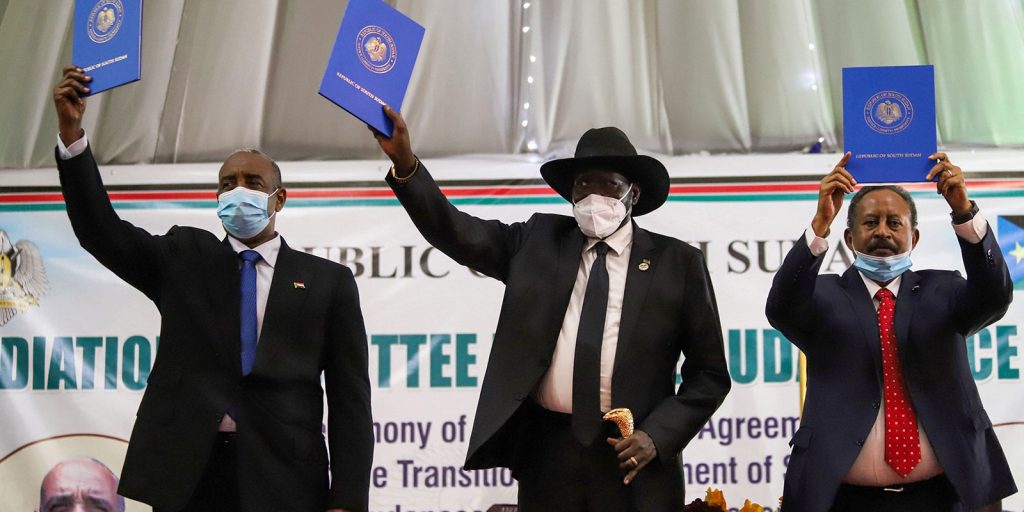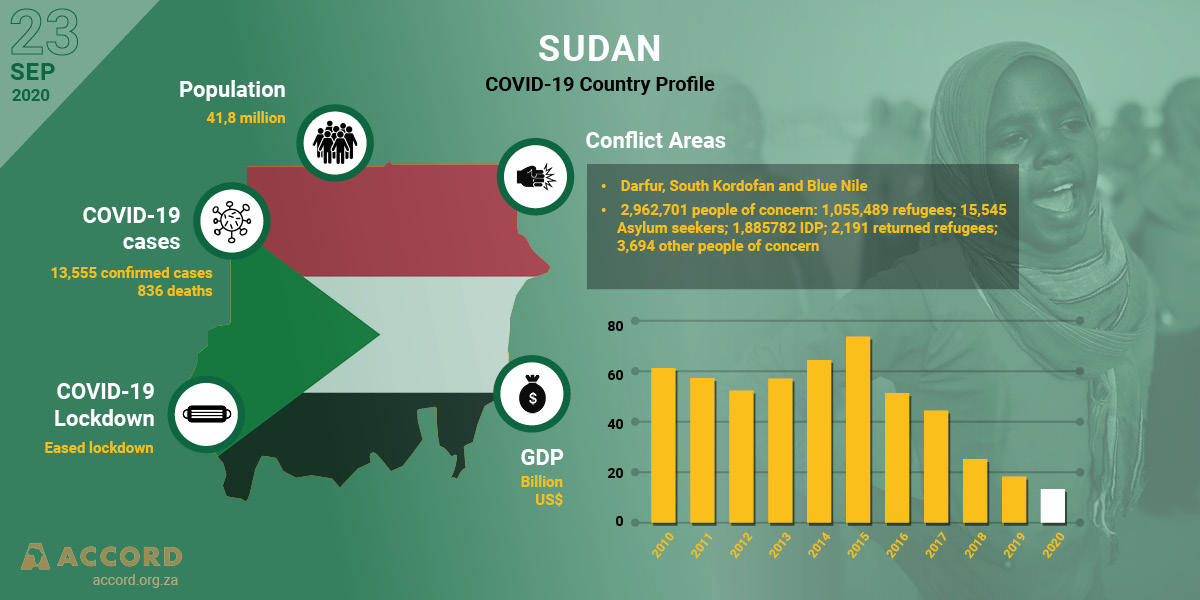All countries, including the most powerful and wealthy, have faced great difficulty in responding effectively to mitigate the impact of COVID-19. However, developing countries are particularly stretched, given the limitations on their public health systems, inadequate public finances to fund responses, shortages of essential equipment, and poor testing and tracing capabilities. Sudan is a model of a country where the pandemic is compounding existing pressures on vulnerable institutions. It is also experiencing the impact of decades of sanctions and poor governance, meaning that the onset of the pandemic found its public healthcare institutions in a particularly dire state.
Despite the immense challenges that #COVID-19 has brought to #Sudan, it has provided a catalyst for the transitional government to undertake difficult economic reforms as an emergency measure to tackle the crisis – Nicholas Haysom, UNSG Special Advisor for Sudan
Tweet
Continuing economic woes
While the government’s attention is necessarily diverted to dealing with COVID-19, the pandemic, is also disrupting ongoing efforts towards economic recovery and adding to growing frustration over Sudan’s worsening economic crisis. Sudan is facing extreme economic challenges following years of economic and political mismanagement, which has seen structural flaws at the macro-economic level and declining public revenue. These in part relate to the erosion of the tax base (notably the existence of tax-exempt parallel commercial enterprises under the control of the military), as well as reduced exports. The genesis of the Sudanese revolution, which started with courageous and prolonged street protests in which scores of people lost their lives, was therefore largely driven by public outcry over economic hardships.
In recent months, soaring inflation (exceeding 140% in July) and continuing shortages of commodities such as bread and fuel – both consequences of the Bashir regime’s practices – have caused protests to reignite across the country. While the Sudanese people remain supportive of the transitional government, frustrations are growing that improvements to people’s lives are not yet visible. There is a thin dividing line in Sudan between economic challenges and political progress.
As with many other countries facing the difficult task of both saving lives and preserving livelihoods, Sudan is having to balance health and economic imperatives. The COVID-19 lockdown measures – while necessary – compounded the existing economic crisis. The government has now been compelled to ease these lockdown restrictions to address the significant economic contraction, even though health commentators warn of the potential continuing prevalence of the virus.
Road to debt clearance
The scale of financial support that Sudan needs to achieve economic recovery is enormous – not least to meet extraordinary debt commitments. However, Sudan has found itself unable to access development assistance from international financial institutions (IFIs) and other official creditors, due to its substantial arrears and continued inclusion on the United States State Sponsor of Terrorism list. Ironically, these barriers to funding and to an improved investor climate are based on the actions of the former regime, which the Sudanese people have themselves overthrown at great personal cost. The road ahead to clear Sudan’s arrears requires meeting qualifications for debt relief, and delivering on the government’s commitment to undertake an ambitious economic reform programme and restore macro-economic stability. This will require international support and financial assistance – yet, here again, the impact of COVID-19 on the international development aid environment has been severe.
Pace of the transition
Amidst these economic woes and almost a year into the transitional period, the government is continuing its efforts to implement the key transition benchmarks laid out in the historic Constitutional Declaration, signed in August 2019.

While some progress has been made in meeting these benchmarks, dealing with the impact of COVID-19 has slowed down the pace of implementation and added another burden to a transitional government already under considerable pressure to deliver change for the Sudanese people. It has seen the generation of tensions within the Cabinet, between the Cabinet and the Forces for Freedom and Change, and between civilians and the military.
Increasing insecurity
The transitional period has also seen insecurity on the rise across many areas of Sudan. The dramatic resurgence of violence in Darfur and elsewhere in recent weeks has added pressure to swiftly implement the recently agreed peace agreement. Due to measures related to COVID-19, the Juba-based peace negotiations moved to a virtual format at the beginning of April, further complicating discussions taking place in parallel tracks. Despite resulting delays, on 29 August, an agreement was reached between the government and participating armed groups (although two significant groups have yet to conclude an agreement) and, on 3 September, an agreement on principles was agreed between Prime Minister Abdulla Hamdok and the Sudan People’s Liberation Movement-North (SPLM-N) led by Abdel Aziz al-Hilu.
Continued international support for #Sudan – both political and financial – will be critical in the coming months to help sustain the transition and weather additional challenges brought about by #COVID-19 – Nicholas Haysom, UNSG Special Advisor for Sudan
Tweet
All participating parties should be commended for continuing the peace process amidst the range of other pressures brought on by the pandemic. However, a notable feature of the peace discussions has been an exaggerated expectation of what the international community will provide in the form of assistance to finance peace dividends, including reconstruction and reparations and the cost of demobilising and reintegrating combatants. The Berlin Partnership Conference, held in June, signalled that, in this time of COVID-19, it will be challenging to secure the scale of peace and development financial support that the parties have indicated they need and expect.
Silver lining
Despite the immense challenges that COVID-19 has brought to Sudan, the pandemic has provided a catalyst for the transitional government to undertake difficult economic reforms quickly as an emergency measure to tackle the crisis. These much-needed reforms, such as fuel subsidy alternatives, have paved the way for the government to reach an agreement with the International Monetary Fund on a Staff Monitored Programme, which is one of the steps needed for debt relief under the IFI Heavily Indebted Poor Country (HIPC) initiative. Financial assistance pledged at the Berlin Partnership Conference will help to offset the economic hardships being felt across Sudanese households.
With progress in the peace talks and the government’s efforts to move ahead with tough economic reforms, Sudan has – notwithstanding the above challenges, and to its credit – achieved real milestones in its transitional journey thus far. It appears to have survived a relatively high sustained COVID-19 infection rate so far – which, at one stage, threatened to overwhelm the health system. We can only hope that the prospect of a vaccine will arrive towards the end of the year – in which case, Sudan’s next political challenge will be to secure equitable access to the vaccine.
Continued international support for Sudan – both political and financial – will be critical in the coming months to help sustain the transition and weather the immense additional challenges brought about by the pandemic. We hope that the corner has been turned in securing the necessary international support for the removal of sanctions and other barriers to Sudan’s general access to the International Development Association (IDA).
Nicholas Haysom is the UN Secretary-General’s Special Advisor on Sudan.

